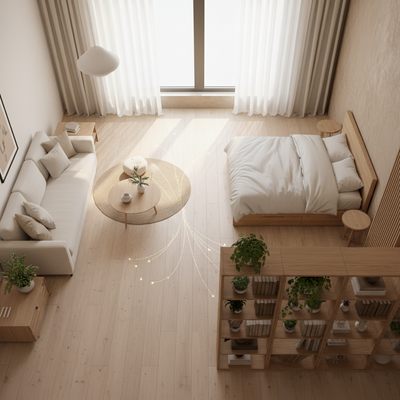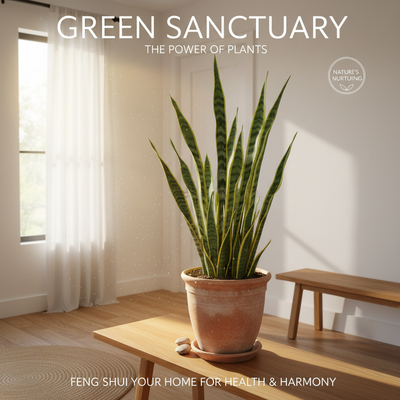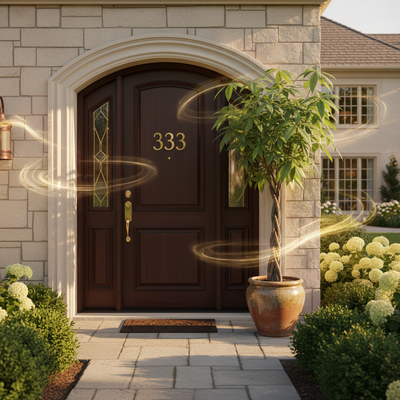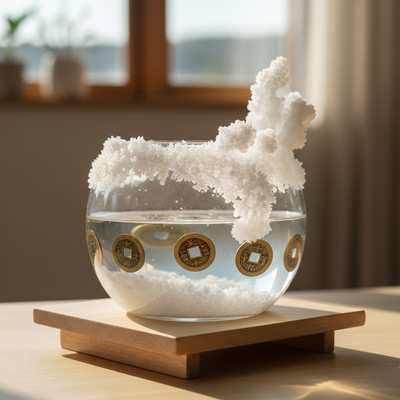The Common Sofa Problem

Putting a sofa in front of a window is one of the most common room layout problems we see. If you're wondering if this setup is okay, your gut feeling is right. In traditional feng shui, placing your main sofa in front of a window isn't the best choice. This setup can make you feel slightly uncomfortable because it doesn't give you symbolic support and can create an energy drain. The good news is that this problem can be easily fixed. In many modern homes, you can't avoid this placement, but it doesn't have to create bad energy. We will explain the main ideas behind this rule and give you many practical solutions, from simple changes to perfect layouts, to make sure your living room feels both beautiful and supportive.
Understanding the Basic Ideas
To really fix the problem of a sofa in front of a window, you need to understand the "why" behind the feng shui advice. This isn't about superstition; it's about how your surroundings secretly affect your sense of safety and well-being. When you understand these basic concepts, you can use solutions with more confidence and purpose.
The Missing Black Tortoise
In Form School feng shui, every home is studied using the Four Celestial Animals, which represent protective energies. Behind you should be the Black Tortoise, a symbolic mountain that gives support, stability, and backing in all parts of your life—from your career and money to your health and relationships. Think of it like a high-backed, solid office chair that supports your back, letting you work with focus and confidence. A window, being see-through and fragile, is the energy opposite of a solid mountain. When your back is to a window on your main sofa, you symbolically don't have this important support, which can show up as feeling unsettled or unsupported in life.
Unstable Qi and Energy Drains
Qi, or Life Force Energy, is the invisible current that flows through our homes and our bodies. It comes in through doors and windows, moves around, and should be allowed to collect and settle in resting areas, like your living room sofa. Windows are considered the "eyes" of the home; they are active doorways where Qi can be rough and can easily escape. When you sit with your back to a window for long periods, you are positioned in this active, and possibly draining, flow of energy. Instead of being able to relax and recharge, your personal energy field must constantly work to stay stable.
Possible Effects of Unstable Qi:
* Feeling unsettled, worried, or "on edge."
* Trouble fully relaxing and recharging your energy.
* A hidden sense of being vulnerable or exposed.
* Restlessness and not being able to get comfortable.
The Weakened Position
The Commanding Position is a main feng shui principle. It refers to the spot in a room where you have the clearest view of the door without being directly in its path. This position gives you a hidden sense of control over your environment and your life, as you can see who and what is coming. While your sofa might be positioned to see the door, having a large, uncovered window directly behind you weakens this command. You cannot see what is happening behind you, creating a blind spot that can trigger a basic sense of vulnerability. Your nervous system stays on low-level alert, which is the opposite of the deep relaxation a living room should provide.
7 Practical Feng Shui Fixes
If moving your sofa is not possible, don't worry. Feng shui is about creating harmony within your existing reality. We use "cures" to reduce or correct energy imbalances. Here are seven effective solutions, ranging from simple additions to bigger changes, to transform your window-facing sofa into a source of stability and comfort.
1. Choose a High-Backed Sofa
The simplest cure is to let the furniture do the work. A sofa with a high, solid back can act as its own "mountain" or Black Tortoise support. The higher and more substantial the back, the greater the sense of security it will provide. When selecting a new sofa for this position, focus on a solid frame and a back that extends above shoulder height when you are seated. This physical barrier creates a powerful psychological and energy buffer between you and the window.
2. Use Curtains and Blinds
Substantial window treatments are one of the most effective cures. They act as a fabric "wall," creating a visual and energy barrier when closed. Choose heavy, solid drapes, solid wood or fake-wood blinds, or layered treatments like Roman shades paired with curtains. The key is substance. Sheer or flimsy curtains will not work. Keep them closed in the evening or anytime you are sitting on the sofa to relax, read, or have private conversations. This simple act transforms the window from an energy leak into a solid, supportive backdrop.
3. Anchor with a Console Table
Placing a solid piece of furniture between the sofa and the window is an excellent way to add a layer of stability. A console table that is at least waist-high and nearly as long as the sofa works best. The table creates physical distance and acts as a buffer. From a feng shui perspective, it adds an extra layer of "earth" or stability behind you. You can then style the table with supportive objects like heavy lamps, books, or sturdy decorative items to further enhance the anchoring effect.
4. Use Plants as a Living Shield
Plants are a powerful feng shui tool because their Wood energy is vibrant, upward-growing, and can help stabilize the flow of Qi. Place tall, leafy plants on either side of the sofa to create a symbolic "guard." Alternatively, a row of smaller, dense plants on a console table behind the sofa can create a living, breathing screen. Choose plants with soft, rounded leaves over sharp, spiky ones. Good choices include the Fiddle Leaf Fig, Rubber Plant, or Snake Plant. They not only buffer the energy but also clean the air and add life to your space.
5. Add Strategic Lighting
Energy, or Qi, is drawn to light. Placing a floor lamp on one or both sides of the sofa can help lift and stabilize the energy in this vulnerable area. The light creates a protective field, drawing the energy upwards rather than letting it drain out the window behind you. Choose lamps that are tall and substantial. When turned on, especially in the evening, they create a warm, protective glow that enhances feelings of safety and coziness, fighting against the exposed feeling the window might create.
6. Ground with an Area Rug
An area rug doesn't directly cure the lack of back support, but it is important for anchoring the entire seating arrangement. A substantial rug defines the conversation area and creates a contained, stable energy field. It visually and energetically grounds the sofa, preventing the feeling that it is "floating" in front of the window. Make sure the rug is large enough that at least the front legs of the sofa and any accompanying chairs are on it. This creates a unified and settled foundation for the entire room.
7. Use Mirrors with Caution
A mirror can be a powerful tool, but it must be used correctly. Never place a mirror where it reflects the window behind the sofa, as this will amplify the energy leak and instability. However, placing a large mirror on the wall opposite the sofa can be helpful. When you are seated, the reflection will show you the solid wall behind you, enhancing your sense of security. It also allows you to see a reflection of the room's entrance, which can help satisfy the principles of the Commanding Position.
Cure & Enhancement Strategy
To help you choose the best solution for your space and budget, we've compared the most effective cures. Often, a combination of two or three of these will give the best results.
| Cure | Feng Shui Effectiveness | Estimated Cost | Aesthetic Impact | Best For... |
|---|---|---|---|---|
| High-Backed Sofa | High | High | Major (defines the space) | Those buying a new sofa. |
| Heavy Curtains/Blinds | High | Medium - High | Significant (adds texture/color) | Bedrooms or living rooms needing privacy. |
| Console Table | Medium - High | Medium | Adds a styling opportunity | Living rooms with space behind the sofa. |
| Tall Plants | Medium | Low - Medium | Adds natural, vibrant element | Bright rooms; adding life and energy. |
| Floor Lamps | Low - Medium | Low - Medium | Adds ambiance and height | Enhancing other cures; creating a cozy feel. |

| Area Rug | Medium | Medium - High | Grounds the entire area | Open-plan spaces needing definition. |
Exceptions to the Rule
Feng shui is a flexible, detailed practice, not a rigid set of strict rules. While placing a sofa against a solid wall is the ideal, there are situations where placing it in front of a window is perfectly acceptable or even better. Understanding these exceptions helps you assess your specific situation with clarity.
-
If the Window is Small and High: A small window, like a transom or clerestory window, that is located well above your head when you are seated does not pose the same threat. It is not directly at your back and therefore does not compromise your energy support.
-
If the View is Secure and Beautiful: A window that overlooks a private, peaceful, and "supportive" landscape can be an exception. A view of a calm lake, a beautiful private garden, or a majestic mountain can bring positive Qi into the home. In this case, the nourishing energy from the view can outweigh the negative of the opening. The key here is "secure"—a ground-floor window facing a busy street would not qualify.
-
If the Room Has No Other Option: In many small apartments or awkwardly shaped rooms, placing the sofa in front of the window is the only logical layout. In this scenario, it is a matter of being practical. Acknowledge that it's not the feng shui ideal, and then focus on carefully applying the cures we've discussed. Using heavy curtains and a console table, for example, becomes essential rather than optional.
-
If It's a Secondary Seating Area: The rules of support are most critical for the main family sofa—the place where you spend the most time relaxing. A secondary loveseat in a sunroom or a small armchair in a reading nook placed by a window is far less problematic. These are temporary spots, not the primary anchor for the family's energy.
The Ideal Sofa Placement
To fully understand why the window placement is challenging, it helps to see the "gold standard" for sofa placement. By aiming for this ideal, you can create a room with optimal energy flow that promotes relaxation, connection, and security.
Back to a Solid Wall
The ideal placement for your main sofa is against a solid, load-bearing wall. This directly provides the "Black Tortoise" support that is fundamental to good feng shui. This solid backing creates a sense of stability and safety, allowing you to truly relax and recharge. The wall acts as your symbolic mountain, grounding you and supporting your efforts.
Ideal Placement Checklist
Use this simple checklist to evaluate your current or planned sofa placement. The more items you can check off, the better your room's feng shui will be.
- [ ] Solid Wall Behind: Is the sofa's back against a solid, interior wall?
- [ ] View of the Door: From your seat, can you easily see the main entrance to the room without being in a direct line with the door's opening?
- [ ] Avoid Sha Qi: Is the sofa clear of any "poison arrows"? This includes sharp corners of walls or furniture pointing at it, or being positioned directly under a heavy overhead beam.
- [ ] Conducive to Conversation: Is the furniture arranged to encourage connection and conversation, typically with chairs facing the sofa, rather than having all seating point toward a television?
When DIY Isn't Enough
While the cures listed above are powerful, sometimes a space has complex challenges or you simply want a complete, personalized analysis. This is where professional guidance can provide clarity and deeper solutions that go beyond a single furniture placement issue.
THE QI FLOW Team in Action
We often consult with clients who have stunning homes with large picture windows and feel forced into placing their sofa in front of them. A recent client had a beautiful modern living room where the view was the main feature, but they confessed they never felt truly "at home" or relaxed in the space.
When THE QI FLOW team approaches a situation like this, we don't just apply a generic cure. Our process begins with a comprehensive analysis of the home's energy map, known as the Bagua, which is determined by the home's orientation. We also analyze the personal energy (Kua number) of the occupants. For this particular client, the living room fell in a sector related to their career and life path. The energy leak from the window was symbolically draining support from their professional lives.
Our recommendation was a multi-layered solution. Based on the room's elemental needs, we advised a specific type of console table—one made of dark wood (Water element) with soft, rounded edges to calm the energy. We then prescribed placing specific plants (Wood element) on the table to help stabilize the Qi and promote growth. Finally, we repositioned a floor mirror to a wall where it reflected the newly created supportive backdrop, doubling its effect. The result was transformative. The clients reported that the room immediately felt cozier and more grounded. Within a few months, they also shared that they felt more confident and supported at work, a tangible reflection of the energetic shift in their home.
Create a Supportive Space
Placing a sofa in front of a window is a common design choice that, from a feng shui perspective, can subtly undermine your sense of security. It challenges the foundational need for support at your back. However, it is a highly correctable issue.
By understanding the principles of the Black Tortoise and Qi flow, you can see why a solid wall is ideal. But more importantly, you are now equipped with a host of practical cures. Whether you choose to invest in a high-backed sofa, install substantial curtains, or anchor the space with a console table and plants, you have the power to shift the energy. Use these principles not as rigid rules, but as tools to create a living room that doesn't just look good, but feels good—a true sanctuary that supports and regenerates you every single day.







